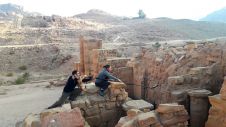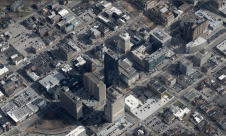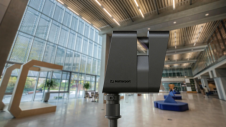ISRSE Symposium
Monitoring, Understanding and Managing of Our Planet’s Environment
Entitled <i>‘Global Monitoring for Sustainability and Security’</i>, the 31st International Symposium on Remote Sensing of Environment (ISRSE) was held for the first time in Saint Petersburg, Russia, from 20-24 June 2005. A regional GOFC-GOLD workshop and an INTAS Strategic Scientific Workshop preceded the symposium.
The theme of the ISRSE was the use of Earth observation systems in monitoring, understanding and managing of our planet's environment with emphasis on global change, security and sustainability. ISRSE was organised by The International Society for Photogrammetry and Remote Sensing (ISPRS), the International Center for Remote Sensing of Environment (NIERSC), Nansen International Environmental and Remote Sensing Center, Russian Federal Space Agency and St. Petersburg State University. Leonid P. Bobylev, chairman of the Organising Committee and NIERSC director, emphasised that the special aim of the symposium was development of an overall system for global monitoring of the Earth: the Global Earth Observation System of Systems (GEOSS).
GOFC-GOLD Workshop
The regional GOFC-GOLD workshop on ‘Observations of Land Cover and Needs of Research Projects in Northern Eurasia’ was opened by Olga Krankina of Oregon State University, Corvallis, OR, USA. The main subjects discussed were land-cover harmonisation and validation, shared information among project teams on observational data resources and networks, and advancing the inventory of observational data on land cover. Garik Gutman of NASA HQ, Washington DC, USA, outlined the contribution of the NASA Land-Cover/Land-Use Change (LCLUC) Program to the Northern Eurasia Partnership Initiative (NEESPI). GOFC-GOLD Northern Eurasia Regional Information Network (NERIN, www. fao.org/gtos/gofcgold/index.html) and Land Cover Implementation Team introduced new large-scale research projects in the region and the FAO Land Cover Classification System (LCCS-2). Dennis Ojima of the Natural Resource Ecology Laboratory of Colorado State University, Fort Collins, CO, USA introduced the notion of land-change science: a paradigm shift to deal with the coupled human-environmental system. He described how our understanding of global change was fundamentally dependent on our ability to better understand the role human activities played in altering natural processes of the terrestrial biosphere.
INTAS Workshop
The title of the INTAS Strategic Scientific Workshop was ‘Towards Europe-wide Coherent and Harmonised Management/ Protection of Inland, Coastal and Marine Ecosystems and Global Climate Change Study: Role of Remote Sensing Means’. The goal here was to develop strategic action that could help improve scientific co-operation activities in the area of Remote Sensing of Environment (RSE). The workshop focused on bringing together scientists and representatives of national and international scientific and industrial organisations from among INTAS members, New Independent States (NIS) of the former Soviet Union and European countries. This event created a real opportunity to learn more about current research activities in the RSE area in NIS and Europe and establish long-term links between research centres.

Value staying current with geomatics?
Stay on the map with our expertly curated newsletters.
We provide educational insights, industry updates, and inspiring stories to help you learn, grow, and reach your full potential in your field. Don't miss out - subscribe today and ensure you're always informed, educated, and inspired.
Choose your newsletter(s)
























